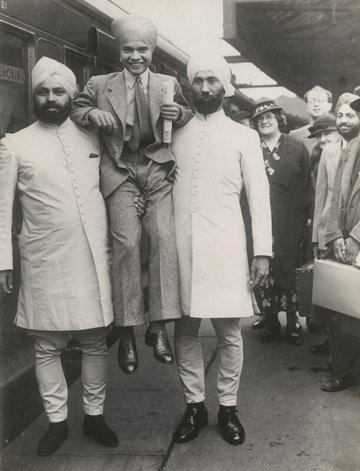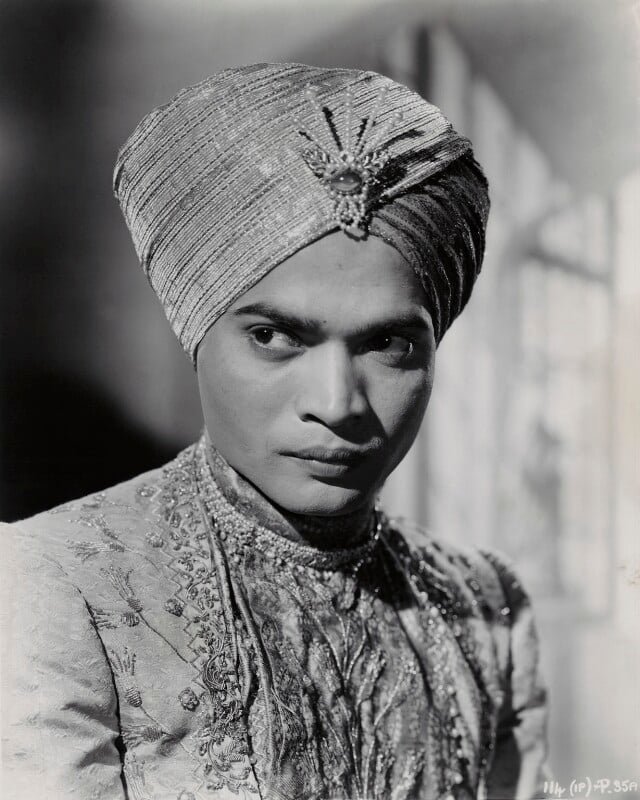
Sabu
‐
Film actor who came to fame in the 1930s
Other names
Selar Shaik Sabu
Sabu Dastagir
Place of birth
Date of arrival to Britain
Date of time spent in Britain
c.1936–40
About
Sabu was born on 27 January 1924 in Karapur, Mysore. He was orphaned at an early age – his mother died when he was very young and he was raised by his father, a mahout, or elephant driver, who died in 1931. The 6-year-old Sabu became the ward of the Maharaja of Mysore, for whom he worked first as a stable boy, then as a mahout.
Sabu became in the 1930s Britain's first leading film star of Indian origin, who achieved international fame as well. His big break came when the veteran documentary filmmaker Robert Flaherty cast him as Toomai, the lead role in the Alexander Korda-produced Elephant Boy (1937) based on Kipling’s story ‘Toomai of the Elephants’.
Elephant Boy had a troubled two-year gestation, with Flaherty being replaced by Zoltán Korda as director and Sabu brought to England for further filming. Although the film received mixed reviews, it made Sabu an instant star and the film was a big box-office hit. The film was the official British entry at the Venice Film Festival and won the award for best direction. While in London, Sabu was taken on a tour of the British capital, broadcast by the BBC from Alexandra Palace, and sat for a sculpture by Lady Kennet and a portrait by Egerton Cooper. Alexander Korda quickly signed him up to a long-term contract. He starred for Korda in The Drum (dir. Zoltán Korda, 1938), based on the novel by A. E. Mason, in which he plays young Prince Azim.
He went on to star as Abu in The Thief of Bagdad (1940). Sabu stayed in Hollywood for the duration of the Second World War. He made a final film for Korda and London Films, The Jungle Book (1942), in which he played Mowgli. He remained in Hollywood after his contract expired, signing with Universal Pictures. He adopted US citizenship in 1944 and joined the US Air Force, flying several missions as a tail-gunner towards the end of the war. He was awarded the Distinguished Flying Cross.
He returned to Britain in 1946, where he joined the director/producers Michael Powell and Emeric Pressburger for his last two British films. In Black Narcissus (1947), in which Sabu gives his most nuanced performance, he plays a young general. The End of the River (1947) gave him another leading role. In 1952–3 he returned briefly to the UK, to perform an elephant act at the Haringey Circus. Sabu spent the rest of his career making relatively undistinguished Hollywood films and building a successful career in property. He died of a heart attack at the age of 39, shortly after completing the film A Tiger Walks (1963) with Disney.
Robert J. Flaherty, Alexander Korda, Zoltan Korda, Merle Oberon.
London Films
Select Filmography:
Elephant Boy (1937)
The Drum (1938)
The Thief of Bagdad (1940)
Arabian Nights (1942)
The Jungle Book (1942)
Black Narcissus (1947)
The End of the River (1947)
Chowdhry, Prem, Colonial India and the Making of Empire Cinema: Image, Ideology, Identity (Manchester: Manchester University Press, 2000)
Flaherty, Frances and Leacock, Ursula, Sabu the Elephant Boy (London: J. M. Dent & Sons, 1937)
Jaikumar, Priya, Cinema at the End of Empire: A Politics of Transition in Britain and India (Durham, NC and London: Duke University Press, 2006)
Whittingham, Jack, Sabu of the Elephants (London: Hurst & Blackett, 1938)
For image and copyright details, please click "More Information" in the Viewer.

Sabu as The Young General in Black Narcissus by unknown photographer, vintage print, 1947, NPG x135435
© National Portrait Gallery, London, Creative Commons, http://creativecommons.org/licenses/by-nc-nd/3.0/
Image credit
Sabu and his bodyguards leaving for New York, by unknown photographer, bromide press print, 1938, NPG x198320
© National Portrait Gallery, London, Creative Commons, https://creativecommons.org/licenses/by-nc-nd/3.0/
